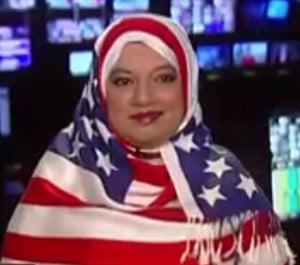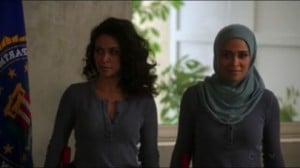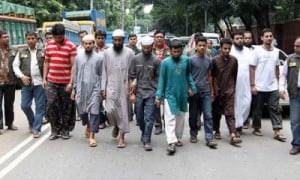I took the a brief moment from work to watch a 12-minute segment on BBC’s Newsnight about why British women choose to wear the niqab and why more women are wearing it in unprecedented numbers. Like any Muslim feminist, I hung onto every word and hoped nobody said something that has already been said before, ad nauseam: “Muslim women who cover their faces are deluded and oppressed.”
But tonight was a little different: it was a program that provided the panacea to what I’ve been railing against since the talks about the French burqa ban exploded in the media. Finally, a whole segment—a brief but precious 152 minutes—on prime time British television was dedicated to only women in hijab and niqab talking about their sartorial choices and views about their British identity. No self-righteous, media-hogging commentators or “experts” were in sight. This was a rare occasion!
Women in niqab have appeared on British television numerous times, but usually in a situation where they are embroiled in a heated debate surrounded by detractors who were often white and male, or Muslim liberals who have little patience for other Muslims who do not fit some absurd model minority mould (Taj Hargey and Yasmin Alibhai Brown, I’m talking to you). Tonight’s program featured three British women, three out of four in niqab, and no one else talking over their heads.
The segment was, however, structured to be a story with two halves. On one side of the debate, three young British women, Rumaysa, Sara, and Ruman, chose to veil their faces, and on the other, one woman, Khola, who had previously done so but currently wears the headscarf. She is against the niqab.
They spoke about their concern for their safety in public spaces, an issue that grabs my heart, even as a hijab-less woman. Any kind of harassment against women—be it sexist, racist, or Islamophobic—is an attack on all women. But the main reason these women were on television is to explain the growing trend of British-born women who take up the niqab.
Debates about Muslim women’s hijab have been rejuvenated following proposals for new British laws to mimic those in France and Belgium. Similar re-assessments about identity and citizenship seem to fuel debates behind the ban, and I was pleased that the women on Newsnight went straight for the jugular of the issue, asserting their British-ness and even their Western-ness.
It shouldn’t be a big deal, calling yourself British or Western. You can have a passport to prove it. But identity can be a tricky beast. It’s tricky when you’re surrounded by people who want to define you and deny your selfhood. Identity is so precious, especially for people in power, who want sole control in determining who’s “in” and who’s “out,” using the language of identity, values, rights, and citizenship, as if they own it.
This has boiled down to whether the niqab (or hijab) is part of British identity and in line with British values. The answer to this should be left to open-ended interpretation, and something a person should be free and confident to define for herself. The women make it a point to say that their mothers do not cover their faces, and that the break with their parent’s generation and religious expectations is part of their process of carving out a uniquely British identity.
Behind the “why” in the question why women choose to cover their faces is a direction towards a potentially productive conversation about gender and clothing. If the non-Muslim British society at large can understand why certain women need to conceal their hair, face, and other parts of their body, then maybe certain irrational, racist, Islamophobic fears can finally be laid to rest.
But to argue that women’s choices in clothes are no one’s business but the wearer’s is to deny the position of society in helping a woman make that choice. Rumaysa, one of the women on the program, argues that by covering her face, her voice becomes the defining element of her identity. But more importantly, it helps her achieve a higher level of spirituality.
Her arguments make perfect sense, but I then wondered why these avenues for spirituality and identity are for women only. Men do not retreat from the world on a daily basis in a niqab or insist on being defined by his voice, thoughts, and ideas rather than the way he looks. These questions will be met with a variety of responses, most I figure will say I’m being a ridiculous, but such responses will certainly point towards the way society works and how that is implicated in why men do not wear the niqab.
By the end of the program, I felt happy that the attention concerning the niqab is taken away from right- and left-wing pundits for once, but I can only be sure that this is only momentarily. Before long they will make noise again, wondering aloud why women should cover their faces.











